Climate Disruption to Lose Trillions
Air Date: Week of February 21, 2025
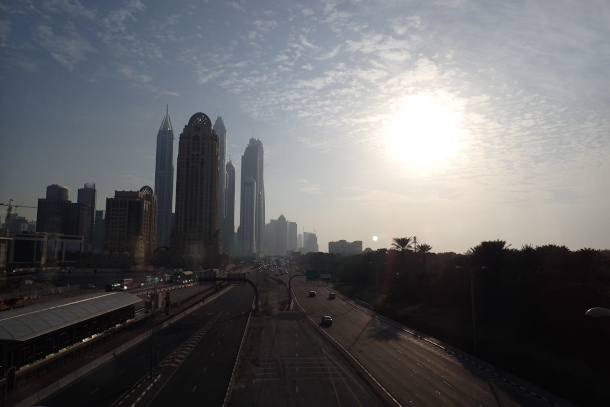
Modeling has shown that large areas of the world are at risk of becoming uninhabitable by 2100 due to extreme heat and weather conditions, including major cities like Dubai that contribute a great amount to the global economy. (Photo: Anna Fuster, Flickr, CC BY-NC-ND 2.0)
As costly climate disasters multiply around the planet, some financial experts are raising alarms that proceeding with business as usual without sharply reducing emissions could cut global GDP in half as soon as 2070. Dr. Tim Lenton is a Professor at the University of Exeter and a co-author of the 2025 Planetary Solvency Report, and he joins Host Jenni Doering to talk about how human civilization can steer towards a more stable future.
Transcript
CURWOOD: It’s Living on Earth, I’m Steve Curwood.
DOERING: And I’m Jenni Doering.
2024 was officially the world’s warmest year since records began in 1850. In fact, the average global temperature rise last year was just shy of 1.5 degrees Celsius since then, the target set by the Paris climate agreement. As costly disasters multiply around the planet, some financial experts are raising alarms about what even more climate disruption could mean for the global economy decades in the future. Economic modeling by the University of Exeter and the Institute and Faculty of Actuaries in the UK, projects that proceeding with business as usual without sharply reducing emissions could cut global GDP in half as soon as 2070. Dr. Tim Lenton is a Professor at the University of Exeter and a co-author of the 2025 Planetary Solvency Report. Dr. Lenton, welcome to Living on Earth!
LENTON: Thank you, Jenni, nice to join you.
DOERING: One of the really interesting or attention grabbing things about your report is that it really drills down and looks at the numbers here in terms of potential hit to global GDP. You find that there's an up to 50% loss in global GDP between 2070 and 2090, I mean, that's just a staggering number. Why is that figure so high, and what is at risk economically?
LENTON: Well, the figure is so high because I'm not the only climate scientist who would tell you that if we go to three degrees centigrade of warming later this century, which is roughly where we're heading on current policies, or, if we're unlucky, and the climate is more sensitive, and that turns out to be four degrees C, or even more, well, we see such fundamental changes in the habitability of large areas of the planet that we find it hard not to conclude that there could be some kind of major social disruption breakdown, and thus an economic breakdown. Perhaps you could think of it also like a 50/50 chance of losing everything or having a major social collapse, because you've got to be careful here. I mean, economists, some of them, have already responded saying, oh, 50% reduction is not so bad if we're going to be three or seven times richer later this century. But what we're really highlighting is a major loss of economy and societies and productive capability.
DOERING: And by the way, why was it important for you and your colleagues to focus on GDP?
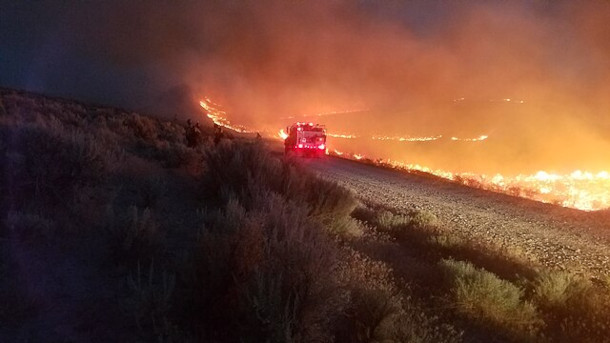
Without sharp cuts in greenhouse gas emissions, forest fires like those seen in LA in January 2025, alongside other natural disasters, are projected to get a great deal more intense and frequent in the next few decades, further contributing to the projected hit to GDP. (Photo: BLM Nevada, Wikimedia Commons, CC BY 2.0)
LENTON: Well, actually, we would rather not, I suppose I would rather not frame the results in terms of GDP, because GDP is well known to be a really flawed measure of human progress, shall we say, or utility or well being. But given that everybody, or culture in general, seems to be speaking this narrow economic language, we felt it was perhaps in order to get the message across, important to stress impacts on GDP, even realizing how flawed a measure it is. But one can get a sense of the the risks to capital and to productivity just by observing today there's large scale withdrawal of insurance from real estate, and real estate is what props up the economy, as we all observed in 2007-8, when there was a financial crisis because of real estate values and expectations were mispriced.
DOERING: Yeah, I mean, and thinking back to 2007 and 2008 that recession that followed, that was a pretty bad time for the world economy, and we might be heading for much worse, it sounds like you're saying,
LENTON: Yeah, we're saying, you can certainly see scenarios where things could be a lot worse. So yeah, we're looking, we're really trying to look here at existential, you might say, risks to the viability of life or economy as we know it.
DOERING: So of course, we're talking about potentially huge economic toll... what are the climate risks that we run as we continue to change the climate?
LENTON: Well, we're probably all now aware that there was a big uptick in climate extreme events, and we've all just seen some good candidate examples at LA wildfires and last year Valencia flooding. But in the broader sense, we're risking crossing tipping points in the climate, which would mean that we trigger a self-propelling, often rapid and hard to reverse change in some major bits of the climate that are doing good things for us at the moment but will be causing trouble if they tip and that means, like the loss of major ice sheets leading to much larger, faster and longer term sea level rise. It means tipping the loss of the Amazon rainforest and replacing it with some kind of degraded forest or savanna. And then there's tipping points in the circulation of the ocean or the atmosphere, or the two of them coupled together. For example, if we have a big tipping point in the Atlantic Ocean's great overturning circulation. We calculated the knock on consequences for production of major crops like wheat and maize would be like a 50% reduction in the viable area for growing those stable crops worldwide. So a huge food and water security crisis in other words.
DOERING: Wow, just staggering impacts. What's the gap between the findings of your report and other commonly used predictions of climate risk?
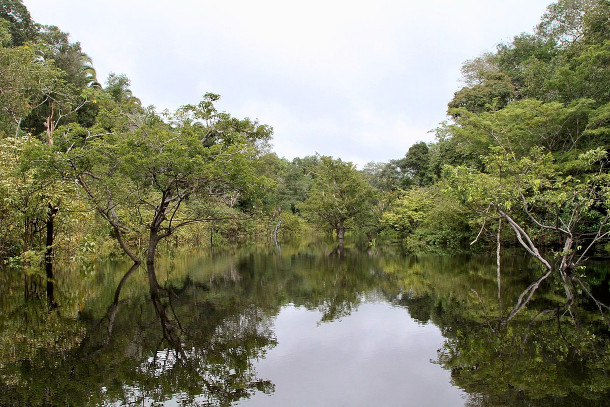
The Planetary Solvency Report suggests we are heading towards a tipping point in the loss of the Amazon Rainforest, which would accelerate the climate’s path towards other harmful tipping points. (Photo: Alexey Yakovlev, Wikimedia Commons, CC BY-SA 2.0)
LENTON: There's a large gap from some of the scenarios or predictions that have been used. The early ones, for example, said that only activities in the economy that were happening outdoors could be impacted by climate change, like agriculture and maybe a bit of opencast mining, and that was only a small percentage of the total economy, something like 10% and the other 80 something or 90% was immune. But we know that that's nonsense, because we all have to get to work for example, we also all got to eat, and somebody's got to grow your food. So you have to think in a more systemic way clearly.
DOERING: So if you're right about the scale of the risk here and the potential for such widespread economic pain, why is the world seemingly in denial?
LENTON: Some are and some aren't, I think would be a fair appraisal not everyone's in denial, and in fact, public surveys across the world typically show that at least three quarters of people think not only is climate change real and due to human activities, but that their government should be doing something more decisive about it. So I think there's a silent majority who absolutely aren't in denial. But why do we struggle with the issue in general? Because we've tended to perceive, well, climate change, firstly, is due to invisible gasses that we can't see. A lot of its impacts unfold over long ish time horizons. So even if they're really big, big risks, they're not like a saber toothed cat running towards us in the Savannah, which is where our brains evolve to deal with risk, and that's the brain we've brought into today's world with all its complex problems of our own making. And then there's enormous vested political and economic interests in the status quo, and one should never underestimate their power.
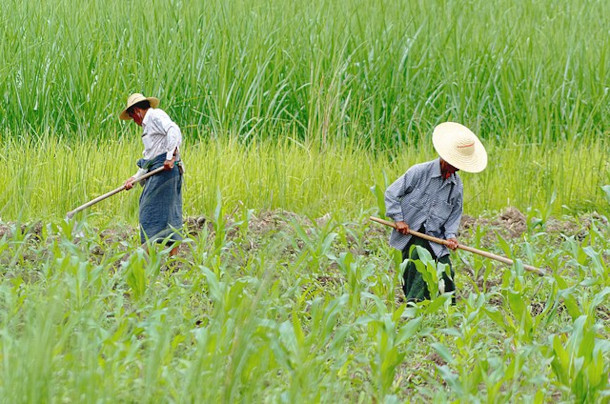
Some previous estimates of the effects of climate change on GDP underestimated the impact by only focusing on outdoor professions in their calculations, such as agriculture. (Photo: Jakub Halun, Wikimedia Commons, CC BY-SA 4.0)
DOERING: I mean, yeah, one observing the political landscape right now, whether you look just in the United States or outside of it, might say that, you know, things aren't looking super hopeful in terms of tackling this crisis.
LENTON: Indeed, I'd have to agree with you there, but I would remind listeners that there are other forces at work in the world, like the fact that in the energy system, the cheapest form of power worldwide now is renewable energy. And in fact, it makes economic sense in over half the world to close existing fossil fuel power stations and replace them with new renewables and battery storage. The more we deploy solar panels or wind turbines or battery storage, the cheaper it gets as well as the better it gets. And that's a really powerful reinforcing feedback that I would argue is so strong now that we might have passed a positive tipping point where the transformation to a renewable energy economy is to some degree unstoppable, although there's still battles to be won there. I mean electric vehicles, there's a backlash against those where there really shouldn't be. You know, they're close to the tipping point of being the obvious, cheaper and better option, but they're not quite there yet, certainly not in the US market. But these we're getting towards what I call positive tipping points in major sectors the economy, major activities.
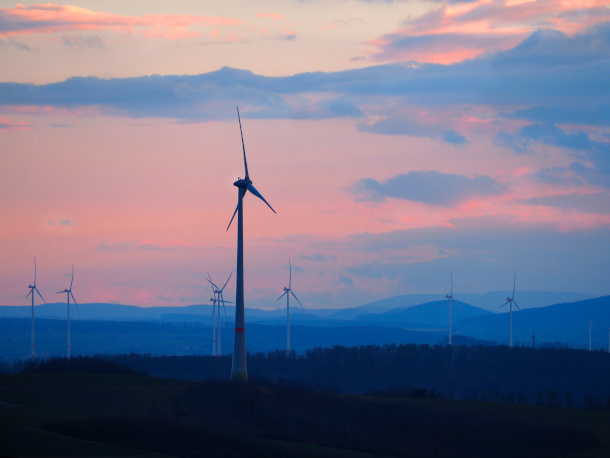
Several forms of renewable energy are already cheaper than fossil-fuel based sources and prices are expected to continue to drop as the renewable energy sector grows globally. (Photo: Michael Mueller, Flickr, CC BY 2.0)
DOERING: How should we as individuals prepare and what should we know about how our day to day lives may change under these scenarios that you're looking at?
LENTON: Well, it's a great question, because I have to answer it myself, with my own kids, you know, and family. I think the first thing to say is, there are these climate risks escalating, and we're not sure we're going to avoid them, but we're stronger together, that we all have got some agency to make the changes that are going to be good for us in lots of ways. They're going to bring all sorts of co-benefits, like clean air from electrifying transport. At the same time, we can be part of social movement to make those changes, and if you like, democratically, try and force our governments to act more decisively, if we choose. I could give a raft of examples of how we've all got some agency to tackle the underlying drivers of climate change at the same time, we've got to admit that we're already seeing nasty damages, and we're not going to be able to avoid all of those. So then it's what agency have we got to cope with nasty events that unfold, and in social resilience, well, that's often built on trust. Building trust in our communities and our societies is a crucial part of building resilience and adaptability, the capability to respond to a changing world.
DOERING: You said you have kids. I don't presume to know how old you are, but I imagine that when we're into the 2070s 2090s, you'd be certainly getting up there in age, but your kids would still be around. What's the world you hope that they would be living in in that later part of this century?
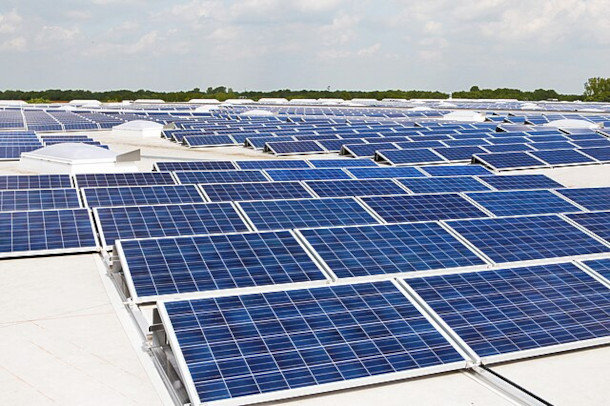
Dr. Tim Lenton hopes that his children will live in a world powered by renewable energy, with minimal impact from climate disruption. (Photo: AleSpa, Wikimedia Commons, CC BY-SA 3.0)
LENTON: Yeah so for reference, my two are 14 and 15, nearly turning 16, so they certainly will be around then. And I'm doing everything in my power to communicate the possibility for us all to get involved and have the agency and exert the agency to make the change, the transformation, that means they'll be living in a future world that whilst it might be somewhere between one and a half and two degrees warmer than the pre industrial level, as we technically call it, and there will be some climate challenges we they will have made the transformation to clean energy and to stopping the destruction of nature, and to be in a situation where we're regrowing or regenerating nature whilst enjoying like the cheapest electricity and ever, we've electrified most of our activities. So we've got a more efficient economy, which is almost certainly a more productive one, with better jobs and better real economy. So I think about that a lot, because it's the actions and the decisions now and through to 2050 that make all of the difference in which of those worlds my kids are going to end up in.
DOERING: Dr Tim Lenton is Professor and Chair in Climate Change and Earth System Science at the University of Exeter and a co author on the planetary solvency report, thank you so much, Dr Lenton.
LENTON: Thanks, Jenni.
Links
Read the Planetary Solvency Report
Inside Climate News | “Peering Into a Bleak, ‘Uninsurable Future’”
The Guardian | “Record-Breaking Growth in Renewable Energy in US Threatened by Trump”
Living on Earth wants to hear from you!
Living on Earth
62 Calef Highway, Suite 212
Lee, NH 03861
Telephone: 617-287-4121
E-mail: comments@loe.org
Newsletter [Click here]
Donate to Living on Earth!
Living on Earth is an independent media program and relies entirely on contributions from listeners and institutions supporting public service. Please donate now to preserve an independent environmental voice.
NewsletterLiving on Earth offers a weekly delivery of the show's rundown to your mailbox. Sign up for our newsletter today!
 Sailors For The Sea: Be the change you want to sea.
Sailors For The Sea: Be the change you want to sea.
 The Grantham Foundation for the Protection of the Environment: Committed to protecting and improving the health of the global environment.
The Grantham Foundation for the Protection of the Environment: Committed to protecting and improving the health of the global environment.
 Contribute to Living on Earth and receive, as our gift to you, an archival print of one of Mark Seth Lender's extraordinary wildlife photographs. Follow the link to see Mark's current collection of photographs.
Contribute to Living on Earth and receive, as our gift to you, an archival print of one of Mark Seth Lender's extraordinary wildlife photographs. Follow the link to see Mark's current collection of photographs.
 Buy a signed copy of Mark Seth Lender's book Smeagull the Seagull & support Living on Earth
Buy a signed copy of Mark Seth Lender's book Smeagull the Seagull & support Living on Earth

